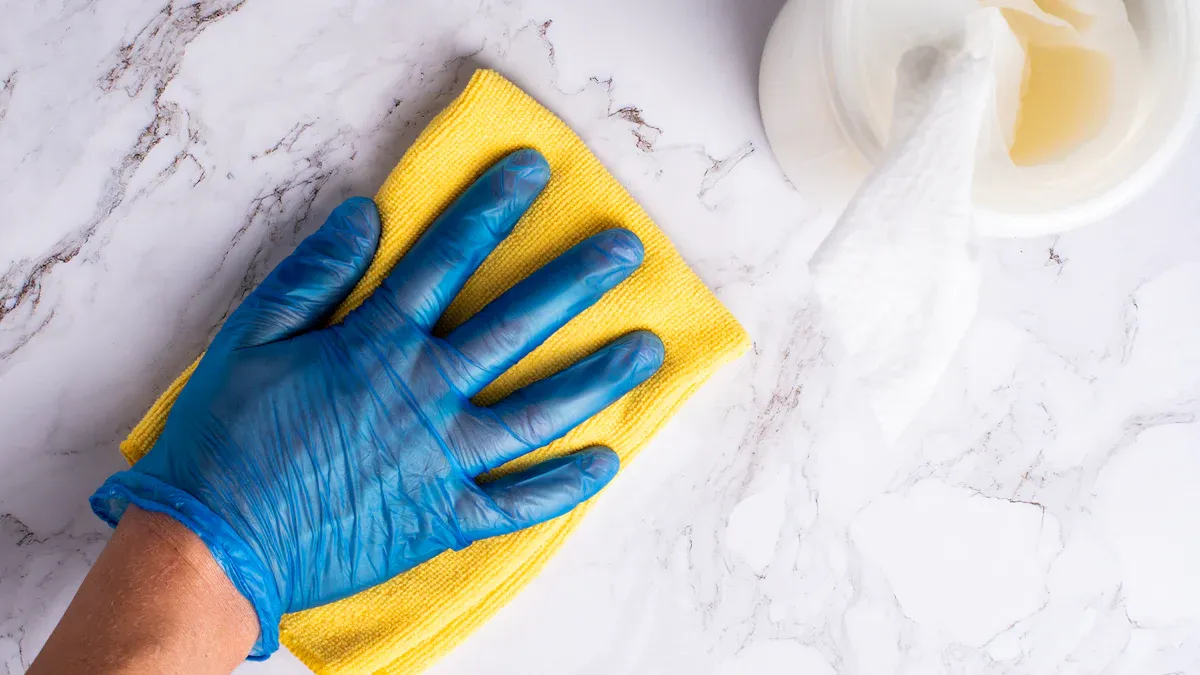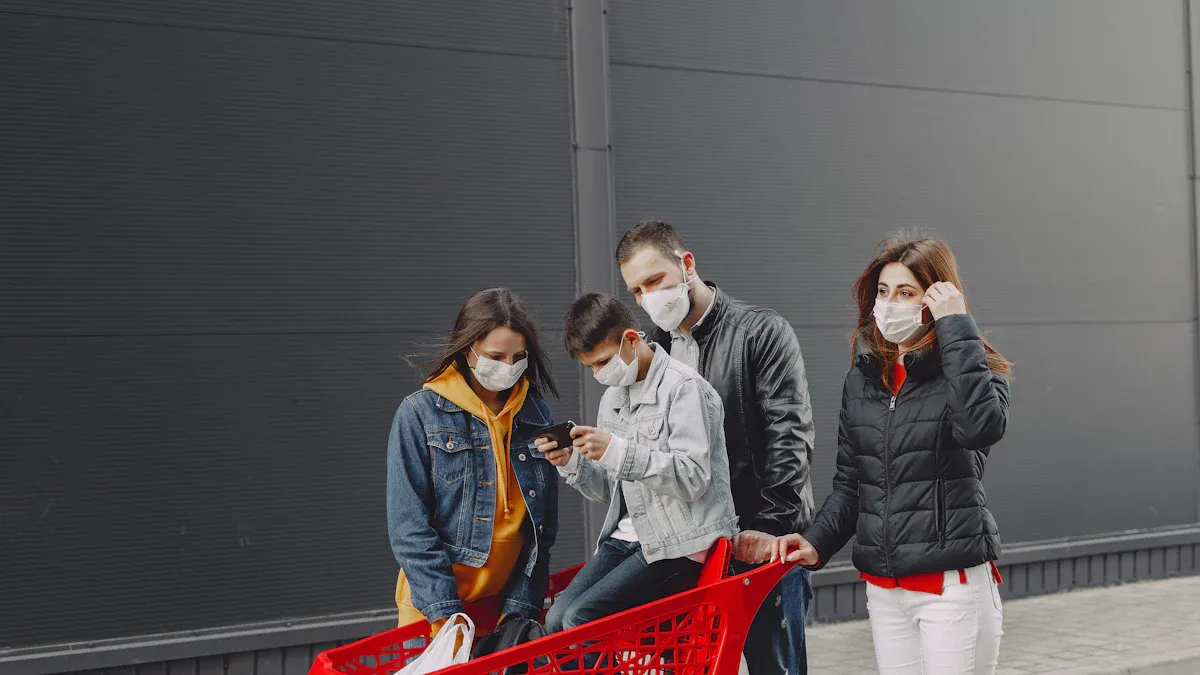How to Create a Safe Haven for Immune-Compromised Family Members

Your home can become a sanctuary for immune-compromised loved ones. By creating a safe home environment for immune-compromised individuals, you protect their health and provide them with peace of mind. Every action you take, no matter how small, contributes to their well-being. You hold the power to reduce risks and foster comfort through thoughtful adjustments. These changes don’t need to be overwhelming. Simple steps, like improving hygiene or limiting exposure to germs, can make a world of difference. Your efforts show love and care, creating a space where they can thrive.
Key Takeaways
Wash hands often and use sanitizer to stop germs. Teach everyone at home to do this for safety.
Set up a special area for your sick family member. Keep it tidy and clean often for comfort and safety.
Clean things people touch daily, like doorknobs and counters. Wipe them with disinfectant to lower the chance of sickness.
Make sure everyone in the family gets their vaccines. This helps protect your loved one from getting sick.
Keep a health journal to note symptoms and changes. It helps find problems early and share with doctors.
Preventive Measures for Creating a Safe Home Environment

Hygiene Practices
Handwashing and sanitizing routines
Frequent handwashing is one of the simplest yet most effective ways to protect your immune-compromised family member. Use soap and water, scrubbing for at least 20 seconds, especially after returning home, before meals, and after touching shared surfaces. If soap and water aren’t available, use a hand sanitizer with at least 60% alcohol. Encourage everyone in your household to adopt this habit. Routine hand hygiene reduces the risk of spreading harmful germs, creating a safer environment for your loved one.
Proper use of masks and gloves
Masks and gloves act as barriers against germs. When caring for an immune-compromised individual, wear a mask if you’re feeling unwell or have been in public spaces. Ensure masks fit snugly over the nose and mouth. Gloves can be useful during cleaning or handling potentially contaminated items, but remember to dispose of them properly after use. These small actions show your commitment to creating a safe home environment for immune-compromised individuals.
Social Distancing at Home
Limiting close contact with others
Maintaining physical distance is vital. Limit unnecessary visitors and avoid close contact with anyone showing signs of illness. Studies show that social distancing significantly reduces infection risks, especially for those with weakened immune systems. Aim to keep at least six feet of distance when possible. This practice not only protects your loved one but also helps prevent the spread of germs within your home.
Designating personal spaces for the immune-compromised individual
Create a dedicated space where your immune-compromised family member can relax without worry. This area should be free from clutter and cleaned regularly. By designating a personal zone, you provide them with a sense of security and comfort. It also minimizes their exposure to germs from shared spaces, reinforcing your efforts in creating a safe home environment for immune-compromised individuals.
Limiting Exposure to Germs
Cleaning and disinfecting high-touch surfaces
High-touch surfaces like doorknobs, light switches, and countertops can harbor germs. Clean these areas daily with soap and water to remove dirt and impurities. Follow up with a disinfectant to kill any remaining pathogens. This two-step process is essential for reducing infection risks. According to health experts, routine cleaning and disinfecting are key to maintaining a safe and healthy home.
Managing deliveries and outside items safely
Items brought into your home, such as groceries or packages, can carry germs. Wipe down surfaces of deliveries with disinfectant wipes and wash your hands afterward. For groceries, rinse fresh produce under running water before storing it. These precautions ensure that outside items don’t compromise the safety of your home environment.
Home Environment Adjustments for Immune-Compromised Individuals
Cleaning Routines
Daily cleaning schedules for shared spaces
Consistency in cleaning shared spaces can make a significant difference in protecting your immune-compromised loved one. Focus on areas like the kitchen, bathroom, and living room. Wipe down surfaces daily with a damp cloth to remove dust and dirt. Follow this with a disinfectant to eliminate harmful germs. A simple schedule, such as cleaning in the morning or evening, ensures these spaces remain safe and welcoming. By sticking to a routine, you create a healthier environment where everyone can feel at ease.
Using safe and effective cleaning products
Not all cleaning products are created equal. Choose products that are both effective against germs and safe for sensitive individuals. Look for labels that indicate they are free from harsh chemicals or strong fragrances. Natural alternatives, like vinegar or baking soda, can also work well for certain tasks. Always test new products in a small area first to ensure they don’t cause irritation. Your thoughtful choices in cleaning products contribute to creating a safe home environment for immune-compromised individuals.
Creating Safe Zones
Setting up a germ-free area for rest and recovery
Designating a specific area as a "safe zone" provides your loved one with a sanctuary for rest and recovery. This space should be free from high traffic and cleaned regularly to minimize exposure to germs. Include comfortable furniture, clean bedding, and essential items within easy reach. Studies highlight the benefits of having a dedicated safe zone, as it reduces the risk of exposure and offers peace of mind. By creating this space, you show your commitment to their well-being.
Minimizing clutter to reduce dust and allergens
Clutter can trap dust and allergens, which may irritate sensitive immune systems. Keep surfaces clear and store items in closed containers to reduce dust accumulation. Regularly vacuum carpets and rugs using a vacuum with a HEPA filter. These small steps help maintain a cleaner and healthier environment, ensuring your loved one can breathe easier and feel more comfortable.
Improving Air Quality
Using air purifiers and maintaining ventilation
Clean air is essential for immune-compromised individuals. Air purifiers with HEPA filters can remove allergens, dust, and airborne pathogens. Research shows that air purifiers significantly reduce the transmission of airborne viruses, especially in high-risk environments. Proper ventilation, like opening windows or using exhaust fans, also helps circulate fresh air. These measures create a safer atmosphere, reducing health risks for your loved one.
Avoiding strong fragrances and pollutants
Strong fragrances from candles, air fresheners, or cleaning products can irritate sensitive respiratory systems. Opt for fragrance-free or hypoallergenic options whenever possible. Avoid smoking indoors or using products that release harmful chemicals. By eliminating these pollutants, you ensure the air remains clean and safe for your immune-compromised family member.
Food Safety and Nutrition for Immune-Compromised Individuals

Safe Food Preparation
Washing hands and surfaces before cooking
Cleanliness is the foundation of safe food preparation. Always wash your hands with soap and water for at least 20 seconds before handling food. Clean all surfaces, utensils, and cutting boards with hot, soapy water to remove bacteria. This simple habit reduces the risk of foodborne illnesses, which can be especially dangerous for immune-compromised individuals.
Avoiding cross-contamination during meal prep
Cross-contamination is a hidden danger in the kitchen. Use separate cutting boards for raw meat and other foods like vegetables or bread. Store raw meat in sealed containers to prevent juices from dripping onto other items. These precautions protect your loved one from harmful bacteria like Salmonella and E. coli.
Healthy Eating for Immune Support
Incorporating nutrient-rich foods
A balanced diet strengthens the immune system. Include foods rich in vitamins and minerals, such as citrus fruits, leafy greens, nuts, and yogurt. Probiotic foods like kefir and fermented vegetables promote gut health, which plays a vital role in immunity. A Mediterranean diet, which emphasizes whole grains, lean proteins, and healthy fats, is an excellent choice for creating a safe home environment for immune-compromised individuals.
Avoiding raw or undercooked foods
Raw or undercooked foods can harbor harmful bacteria. Avoid items like sushi, rare meats, and unpasteurized dairy products. Cook all meats to their recommended internal temperatures and ensure eggs are fully cooked. These steps minimize the risk of foodborne illnesses.
Storing Food Safely
Proper refrigeration and labeling
Proper storage keeps food fresh and safe. Refrigerate perishables immediately, keeping your fridge at or below 40°F and your freezer at 0°F. Label leftovers with dates to track freshness. Following these guidelines prevents the growth of harmful bacteria.
Discarding expired or spoiled items
Regularly check your fridge and pantry for expired or spoiled items. Discard anything past its expiration date or showing signs of spoilage, such as mold or an off smell. Keeping your kitchen free of unsafe foods ensures a healthier environment for your loved one.
Family and Visitor Guidelines for a Safe Home Environment
Vaccination and Health Precautions
Ensuring family members are up-to-date on vaccines
Vaccines play a vital role in protecting your immune-compromised loved one. Make sure everyone in your household stays current on their vaccinations, including flu shots and other recommended immunizations. This simple step strengthens the collective defense against harmful illnesses. By prioritizing vaccinations, you create a safer environment where your loved one can feel secure.
Avoiding visits from sick individuals
Illness can spread quickly, especially to someone with a weakened immune system. Politely ask anyone feeling unwell to postpone their visit. Even mild symptoms like a cough or runny nose can pose a risk. Your proactive approach ensures that your home remains a safe haven for your loved one.
Limiting Guests
Setting boundaries for visitors
Setting clear boundaries for visitors helps maintain a controlled and safe environment. Limit the number of guests at any given time and prioritize visits from those who are essential. Share these boundaries with your family and friends to avoid misunderstandings. This thoughtful measure reduces exposure to potential risks while keeping your loved one’s health a top priority.
Communicating safety expectations with guests
Open communication with visitors is key. Let them know about the precautions you’re taking to protect your immune-compromised family member. Encourage them to wash their hands upon arrival and avoid bringing unnecessary items into your home. When guests understand your expectations, they’re more likely to support your efforts in creating a safe home environment for immune-compromised individuals.
Pet Precautions
Keeping pets clean and healthy
Pets bring joy and comfort, but they can also carry germs. Regularly groom and bathe your pets to keep them clean. Ensure they’re up-to-date on vaccinations and flea treatments. A healthy pet contributes to a healthier home, reducing risks for your immune-compromised loved one.
Limiting pet access to certain areas
Designate specific areas in your home where pets are not allowed, such as the immune-compromised individual’s personal space. This minimizes the spread of allergens and germs. Providing your pet with their own cozy area ensures they feel included while maintaining a safe environment for your loved one.
Monitoring and Emergency Preparedness for Immune-Compromised Individuals
Recognizing Symptoms
Identifying early signs of infection
Staying alert to changes in health is crucial. Watch for symptoms like fever, fatigue, or unusual pain. These can signal an infection. Encourage your loved one to share how they feel daily. Early detection allows for quicker action, reducing the risk of complications. Keep a thermometer and other basic tools handy to monitor their condition.
Keeping a log of health changes
A health journal can be a lifesaver. Record symptoms, medications, and any changes in their condition. This log helps you spot patterns and provides valuable information for healthcare providers. Use a notebook or a digital app to keep everything organized. Consistency in tracking ensures you stay ahead of potential health issues.
Having a Medical Plan
Preparing a list of emergency contacts
Emergencies can happen anytime. Prepare a list of essential contacts, including doctors, specialists, and nearby hospitals. Share this list with family members so everyone knows who to call. Keep it visible, like on the fridge or near the phone. Quick access to this information can save precious time during a crisis.
Keeping medications and medical supplies accessible
Ensure all medications are stored in one place. Use labeled containers to avoid confusion. Stock up on essential supplies like gloves, masks, and disinfectants. For individuals with moderate to severe immune compromise, healthcare experts recommend additional doses of mRNA COVID-19 vaccines, such as Pfizer-BioNTech or Moderna, to enhance protection. Staying prepared ensures your loved one gets the care they need without delay.
Population | Intervention | Background |
|---|---|---|
An additional dose of Pfizer-BioNTech or Moderna COVID-19 vaccine at least 28 days after the initial series. | Immunocompromised individuals are at higher risk for severe illness from COVID-19, necessitating enhanced vaccination strategies. |
Staying Informed
Following healthcare provider recommendations
Your healthcare provider is your best guide. Follow their advice on medications, treatments, and lifestyle adjustments. Regular check-ups ensure your loved one stays on track. Trust their expertise to navigate complex health challenges.
Staying updated on local health advisories
Health risks can change quickly. Stay informed about local outbreaks or public health updates. Reliable sources like the CDC or WHO provide timely information. Being aware of potential risks helps you make informed decisions to protect your family.
Tip: Sign up for alerts from trusted health organizations to receive updates directly to your phone or email.
Creating a safe home environment for immune-compromised individuals is a journey of care and dedication. By focusing on hygiene, limiting exposure to germs, and making thoughtful adjustments, you can transform your home into a sanctuary. Every small step you take, from improving air quality to setting boundaries for visitors, makes a difference.
Your proactive measures protect your loved ones and show them how much they matter. These efforts not only safeguard their health but also enhance their quality of life. You have the power to create a space where they feel secure, supported, and valued.
Remember: Your actions, no matter how small, bring comfort and safety to those who need it most.
FAQ
How often should I clean shared spaces in my home?
You should clean shared spaces daily. Focus on high-touch surfaces like countertops, doorknobs, and light switches. Regular cleaning reduces germs and creates a safer environment for your immune-compromised loved one.
Tip: Use a disinfectant after cleaning to ensure thorough germ removal.
Can pets stay in the same room as an immune-compromised family member?
Pets can stay in the same room if they are clean and healthy. However, designate specific areas where pets are not allowed, like the immune-compromised individual’s personal space. This minimizes allergens and germs.
What is the best way to store medications for easy access?
Store medications in a single, labeled container. Keep them in a cool, dry place that’s easy to reach. This ensures quick access during emergencies and avoids confusion.
Note: Check expiration dates regularly to ensure medications remain effective.
Should visitors wear masks when visiting my home?
Visitors should wear masks if they’ve been in public spaces or feel unwell. Masks reduce the risk of spreading germs, protecting your immune-compromised loved one. Communicate this expectation clearly before their visit.
How can I improve air quality in my home?
Use air purifiers with HEPA filters and open windows for ventilation. Avoid strong fragrances and pollutants like smoke. Clean air reduces health risks and creates a comfortable environment for your loved one.
Tip: Regularly replace air purifier filters for optimal performance.
See Also
Join Us at Banish Cancer – A Place of Hope
Exploring Symptoms and Care for Lymphomatoid Granulomatosis
Identifying Angioimmunoblastic T-Cell Lymphoma Symptoms and Signs
A Comprehensive Guide to AIDS Related Lymphoma
Exploring Symptoms and Therapies for Large Granular Leukemia

